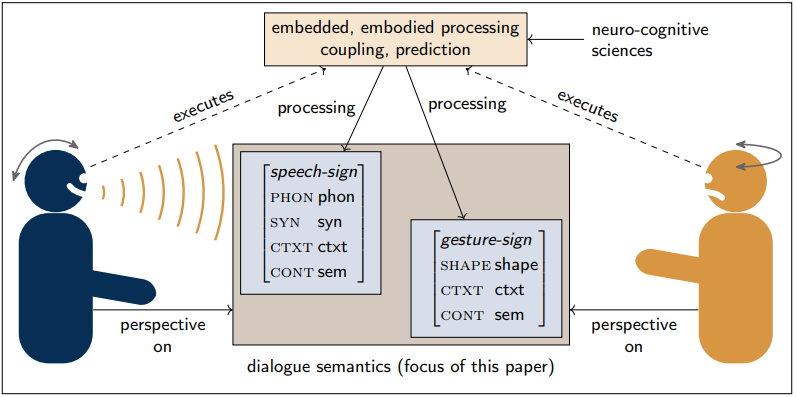Lecture 1
Antecedents (speech act theory, language games, conversational analysis), spoken discourse and non-standard phenomena, brief introduction to TTR and KoS.
NASSLLI 2022 workshop. Monday, June 20th – Friday, June 24th, 2PM--3:20PM, Taper Hall 116.
What are the desiderata for a theory of dialogue? The course will present two desiderata, one rather classical in its emphases, the other relating to more recent developments. The first desideratum can be related to the classical version of the Turing test: model/simulate the ability of an adult agent to participate in a conversation. Even a restricted version of the test—the ability to simulate the range of possible responses to a question—is a significant challenge for all current theories of dialogue. In the first part of the course we will present a framework that has one of the most detailed attempts at meeting Turing's challenge: the KoS framework, which is formally underpinned by a Type Theory with Records. KoS synthesizes: speech act theory, Wittgensteinian language games, formal semantics, and conversational analysis to yield a detailed theory of dialogical relevance from the micro-level (self-repairs, interjections) to the macro-level (the structure of complete conversations). This provides a theory of context that can underpin the analysis of a variety of dialogical phenomena such as non-sentential utterances, repair, and quotation. However, it also provides a new perspective on well trodden phenomena such as quantification and compositionality. We introduce a more challenging desideratum: dialogue across the lifespan—from interaction with infants at different developmental stages and concluding with the effects aging has on interaction. To address this desideratum, we will show how non-verbal social signals such as crying, laughter, and smiling, which are present both among non-human primates and infants and develop into highly complex behaviours among adults can be integrated into KoS. This requires us to integrate multimodality in the framework and to consider manual and head gestures. We will consider how to model the earliest grammars among children, where semantic complexity is achieved by exploiting both visual and interactive context. We will conclude by discussion of aging and how it requires us to confront forgetting, an aspect missing from contemporary work on dialogue.
Jonathan Ginzburg is Professor of Linguistics at the Laboratoire de Linguistique Formelle-CNRS at the Université Paris Cité.
Andy Lücking is Postdoctoral Research Fellow at the Laboratoire de Linguistique Formelle (LLF) at the Université Paris Cité.

Antecedents (speech act theory, language games, conversational analysis), spoken discourse and non-standard phenomena, brief introduction to TTR and KoS.

Referential Transparency Theory—a dialogically driven approach to quantified NPs without sets of sets; pointing


Integrating multimodality: non-verbal social signals [crying, smiling, laughing] and head gestures.

first grammar/interaction patterns; Integrating context and memory: interaction with the aged.
What to read for the lectures:
Cooper, Robin and Jonathan Ginzburg. 2015. Type theory with records for natural language semantics. In S. Lappin and C. Fox, eds., The Handbook of Contemporary Semantic Theory, chap. 12, pages 375–407. Oxford, UK: Wiley-Blackwell, 2nd edn. (Preprint)
Ginzburg, Jonathan. 2016. The Semantics of Dialogue. In: Maria Aloni and Paul Dekker (eds), Cambridge Handbook of Formal Semantics, Cambridge University Press.
Ginzburg, Jonathan and Massimo Poesio. 2016. Grammar is a system that characterizes talk in interaction, Frontiers in Psychology, DOI: 10.3389/fpsyg.2016.01938
Lücking, Andy and Jonathan Ginzburg. 2022. Referential transparency as the proper treatment of quantification. Semantics and Pragmatics, vol. 15, doi: 10.3765/sp.15.4.
Lücking, Andy, Thies Pfeiffer and Hannes Rieser. 2015. Pointing and Reference Reconsidered, Journal of Pragmatics, vol. 77, pp. 56-79, DOI: 10.1016/j.pragma.2014.12.013.
Lücking, Andy. 2018. Witness-loaded and Witness-free Demonstratives. In: Atypical Demonstratives, M. Coniglio, A. Murphy, E. Schlachter, and T. Veenstra (Eds), De Gruyter, 2018 (Preprint).
Ginzburg, Jonathan, Zulipiye Yusupujiang, Chuyuan Li, Kexin Ren, Aleksandra Kucharska, and Paweł Łupkowski. 2022. Characterizing the Response Space of Questions: data and theory. To appear in Dialogue & Discourse (Preprint)
Ginzburg, Jonathan and Philip Miller. 2019. Ellipsis in HPSG. In: Jeroen van Craenenbrock and Tanja Temmerman (eds.) Handbook of Ellipsis. Oxford University Press, New York. (Preprint)
Wong, Kwong-Cheong and Jonathan Ginzburg. Conversational types: a topological perspective. In: 2018. Proceedings of SemDial.
Ginzburg, Jonathan, Chiara Mazzocconi, and Ye Tian. 2020. Laughter as Language. Glossa: A Journal of General Linguistics, 5(1), 104, DOI: 10.5334/gjgl.1152
Mazzocconi, Chiara, Ye Tian and Jonathan Ginzburg. 2020. What's your laughter doing there? A taxonomy of the pragmatic functions of laughter In: IEEE Transactions on Affective Computing, DOI: 10.1109/TAFFC.2020.2994533 (Preprint).
Lücking, Andy and Jonathan Ginzburg. 2021. Saying and shaking `No’. In: Proceedings of the 28th International Conference on Head-Driven Phrase Structure Grammar, Online (Frankfurt/Main), pp. 283-299, DOI: 10.21248/hpsg.2021.15
Ginzburg, Jonathan and Andy Lücking. 2021. Requesting clarifications with speech and gestures. In: Beyond Language: Multimodal Semantic Representations, MMSR I. Online Workshop held in conjuction with IWCS 2021.
Lücking, Andy. 2021. Gesture. In: Head Driven Phrase Structure Grammar: The handbook. Ed. by Stefan Müller, Anne Abeillé, Robert D. Borsley and Jean-Pierre Koenig. Empirically Oriented Theoretical Morphology and Syntax 9. Berlin: Language Science Press. Chap. 27, pp. 1201–1250. doi: 10.5281/zenodo.5543318. url: https://langsci-press. org/catalog/book/259
Hadji Moradlou, Sara. 2019. Early child grammars. PhD diss., Université Paris Cité.
Moradlou, Sara, Xiaobei Zheng, Ye Tian, and Jonathan Ginzburg. 2020. Wh-Questions are understood before polar-questions: Evidence from English, German, and Chinese. In: Journal of Child Language 28:1-27. (Preprint)
Cooper, Robin, Jonathan Ginzburg, Staffan Larsson. Forthcoming. Learning Language Games Probabilistically: From Crying to Compositionality. In: Jean-Philippe Bernardy, Rasmus Blanck, Stergios Chatzikyriakidis, Shalom Lappin, Aleksandre Maskharashvili (eds.). Probabilistic Approaches to Linguistic Theory, CSLI Publications, Stanford. (Preprint)
Ginzburg, Jonathan and Andy Lücking. 2020. On Laughter and Forgetting and Reconversing: a neurologically-inspired model of conversational context. In: S. Malamud et al (eds.). Proceedings of SemDial, Virtually at Brandeis, Waltham, New Jersey.